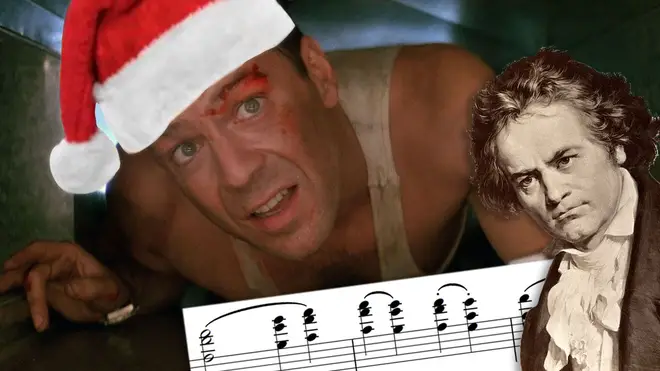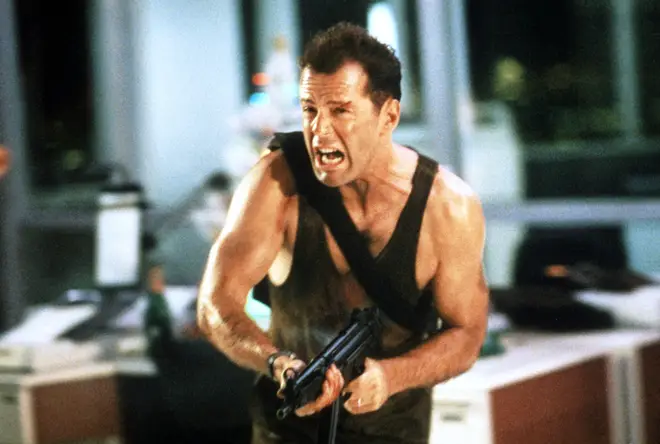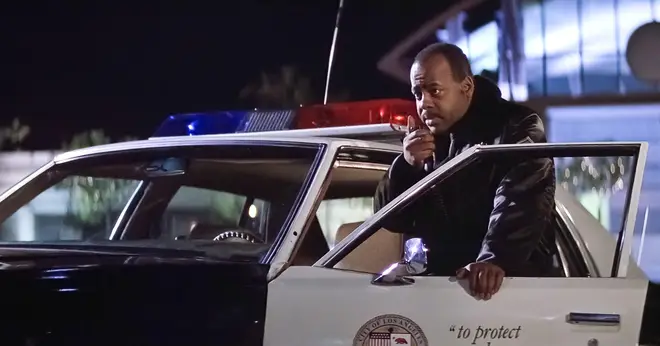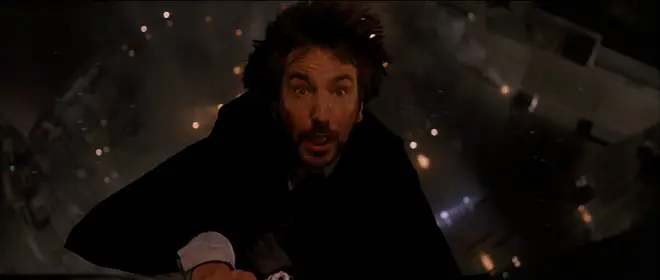Is Die Hard a Christmas movie? Here’s what the soundtrack tells us…
22 December 2021, 17:06

From Beethoven, to Let it Snow, what does the Die Hard soundtrack reveal about its debated place in Christmas movie history?
Listen to this article
Loading audio...
The mere-mention of ‘Die Hard’ and ‘Christmas’ in the same sentence is enough to set the Internet off, so we wanted to answer this viral question once and for all.
Is Die Hard a Christmas movie?
Naturally, as a site dedicated to classical music, we will be examining the score, lyrics, instrumentation, and musical quotations to find answers.
If you know your Beethoven from your Bruce Willis, then come on this musical journey with us, as we attempt to decode the music behind the screen...

Let’s start with a recap of the plot
New York cop, detective John McClane (Bruce Willis), arrives in Los Angeles to visit his estranged wife, Holly Gennero (Bonnie Bedelia). Gennero is attending a Christmas Eve work party organised by her employer Nakatomi Corporation, and McClane meets her at her offices in skyscraper, Nakatomi Plaza.
Unbeknownst to the guests, a terrorist plot organised by a German criminal mastermind, Hans Gruber (Alan Rickman), is unfolding, and those at the party soon become hostages to the group. McClane, who is not part of the company, manages to remain unnoticed and escapes into different parts of the building, unsuccessfully trying to alert local authorities to the situation.
When help does come, it arrives in the form of LAPD sergeant, Al Powell (Reginald VelJohnson), who can only help McClane out from down on the ground. As McClane learns that the authorities will be no immediate help, he realises that he has to take on the terrorists completely alone in order to save all the hostages, and his wife.

Who composed the music for Die Hard?
Michael Kamen wrote the score for Die Hard and its two subsequent sequels, Die Hard 2 (1990) and Die Hard with a Vengeance (1995).
His previous work included eleven ballets, one saxophone concerto, and an electric guitar concerto which was originally performed by Eric Clapton.
Other notable scores include the 1989 Bond film, Licence to Kill, Disney’s 101 Dalmations, the American superhero film X-Men, and Robin Hood: Prince of Thieves.
Beethoven’s involvement at Nakatomi Plaza
The director of Die Hard, John McTiernan, knew he wanted to include Ode to Joy from Beethoven’s Symphony No.9 after he heard it in Stanley Kubrick’s 1971 film, A Clockwork Orange.
He hired Kamen after this decision, and the composer wasn’t convinced that the piece was suitable for the film. Kamen instead suggested misusing a piece written by fellow German symphonic composer, Richard Wagner.
However, after McTiernan showed Kamen how the choral work had been used in the 1971 Kubrick film to underscore the ultra-violence, which gave Kamen a better understanding of the director’s intentions.
The American composer therefore insisted that as well as including the Ninth Symphony, they should also license Singin’ in the Rain, another track used in A Clockwork Orange.

Watch This Incredible Beethoven 'Ode to Joy' Flashmob
Kamen used Ode to Joy, Singin’ in the Rain, and Winter Wonderland – three songs which in most contexts seem upbeat and joyful – to underscore the villains of the film.
This juxtaposition is seen multiple times throughout the score, and Ode to Joy is purposefully scored below its usual pitch to give it a darker, menacing tone.
Most noticeably, the work is used to underscore the opening of the safe by the group of German terrorists. In the safe opening scene, the triumphant nature of the music gives the subtle implication to the audience that the bad guys might have just won...
Having the Ninth Symphony as Gruber’s theme is a dark Easter Egg, as most musicians will know that Beethoven’s Symphony No.9 was the composer’s last symphony before he died.
The Ninth Symphony is often regarded as Beethoven’s greatest work by musicologists, and in the same way, after perhaps what is Gruber’s greatest work (taking over the plaza and breaking into the safe), the antagonist dies.

Die hard 1988 Theo opens the Nagatomi vault 1080p HD
Many characters in the film end up singing the musical theme most associated with them, including Gruber who hums the Ode to Joy while in an elevator earlier in the film.
Theo, the sole computer hacker in Gruber’s terrorist group, hums Singin’ in the Rain, and the Christmas classic, Let it Snow, which is sung by sergeant Al Powell both while overhearing it at a gas station before he arrives at Nakatomi Plaza, and again after he finishes his preliminary investigation there.
This musical way of directing came naturally to McTiernan, who said in the director’s commentary: “I found myself thinking of movies as musical structures.
“I kind grew up around opera and even though I’m musically illiterate, I think in musical forms at least.”
His musical influence also means that the film features another well-known piece of classical music; Bach’s Brandenburg Concerto No. 3. This is played by the musicians shown at the party at the beginning of the movie, before the action starts to take place.

What does the score say?
We’ve already mentioned two classic Christmas songs, Winter Wonderland, and Let it Snow! which feature in the film, and there’s also a third track, Christmas in Hollis, which plays early on in the movie.
So let’s examine other musical choices which place this film firmly into the Christmas movie genre.
In the original score, classic Christmas tropes were used in the instrumentation. The inclusion of sleigh bells, pizzicato and arco strings, with full brass, and flurrying woodwinds match every stereotype used by composers when writing ‘Christmassy’ music.
Read more: What makes Christmas music sound so Christmassy?
In-keeping with the juxtaposition, these musical festive frills are added to menacing moments in the film, to remind the viewer that this gritty action film they’re watching, is actually taking place at Christmas.
Coming back to the use of Christmas music in the film, Let it Snow is a clever choice for a recurring theme thanks to its lyrics. As well as its Christmas-themed nature, the words of the songs help play out what is happening in the film.
Although maybe a bit on the nose, the third line of the song is “and since we’ve no place to go, Let it Snow! Let it Snow! Let it Snow!”
Like the characters in the song, the protagonists in the film also have no place to go as they are hostages in a skyscraper.
The song also concludes the entire film, playing as the credits role and the protagonists reunite after the traumatic events of the film.

Let It Snow! Let It Snow! Let It Snow! (Remastered 2017)
So, is Die Hard a Christmas movie?
From the perspective of the score, we think it’s a yes. From its stereotypical festive instrumentation, to its inclusion of three separate Christmas songs, the music speaks for itself.
Whether you choose to watch it during the holiday period is up to you, all we can add is that hopefully after this article, you understand that this film and score is good enough to watch all year round.






















